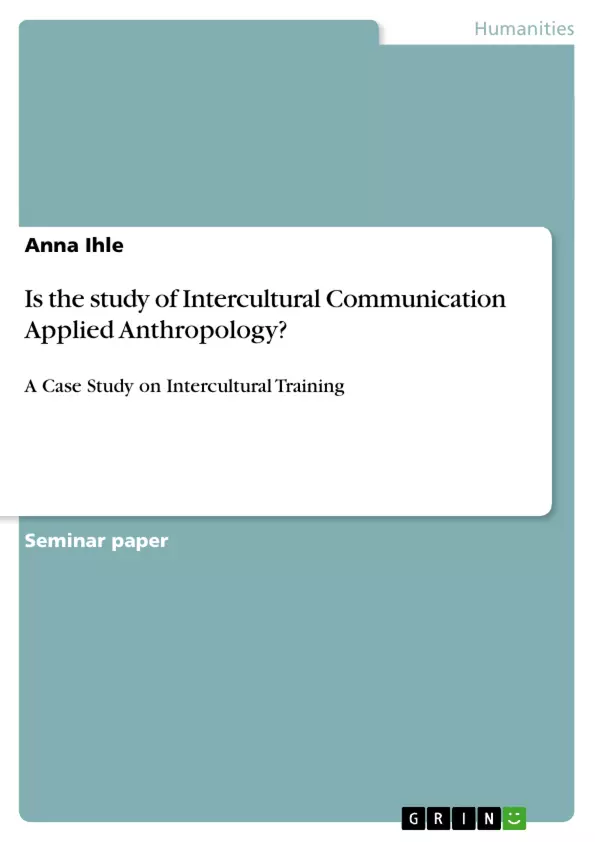As anthropologists we want to make a difference in our world. Intercultural training provides us with that opportunity.
(Ojile 1986: 48)To make a difference includes the issue of change which is essential to the discipline of applied anthropology. Training in cross-cultural interaction and behaviour forms part of communication. Constitutes intercultural communication therefore a part of the academic discipline of applied anthropology? This paper tries to further investigate the correlations between these two academic fields.
Since one of the most obvious developments in contemporary society is that the world is continuously growing closer and closer, people get to meet and communicate that would have never met a few hundred years ago. Objects, customs and information get accessible that open up new worlds and horizons for any individual. As innovative opportunities arise with a closer interlinked worldwide society, also problems occur. People with different attitudes, perceptions, worldviews and ideas are confronted with each other and are being forced to communicate. This is where the discipline of intercultural communication comes in to inquire, clarify and explain the newly appeared circumstances. But is this concrete facilitation part of the larger context of applied anthropology?
As the author wants to further investigate this issue, she draws first on the definitions of the most important two terms to afterwards clarify the specific role expected of an applied anthropologist. A case study is used to relate this theoretical matter to a concrete situation. The example of cross-cultural training is employed as a practical and functional aspect of intercultural communication. This is followed by an overall evaluation in which the case study as well as the theoretical discussion are combined to answer the presented question. The conclusion infers the whole topic and tries to give an outlook on future development.
Inhaltsverzeichnis (Table of Contents)
- Introduction
- Definitions
- Applied Anthropology
- Intercultural Communication
- The Role of an Applied Anthropologist
- Case Study: Intercultural Communication in Corporations
- Situation
- Definition of Intercultural Training
- Needs and Outcome of Intercultural Training
- Content and Structure of Intercultural Training
- Job field: Anthropologists in Intercultural Training
- Evaluation
Zielsetzung und Themenschwerpunkte (Objectives and Key Themes)
This paper investigates the relationship between applied anthropology and intercultural communication. It aims to determine whether intercultural communication constitutes a part of applied anthropology. The analysis uses a case study of intercultural training in corporations to illustrate the practical application of these fields.
- The definition and scope of applied anthropology.
- The definition and scope of intercultural communication.
- The role of applied anthropologists in intercultural contexts.
- The application of intercultural communication training in corporations.
- The evaluation of the relationship between applied anthropology and intercultural communication training.
Zusammenfassung der Kapitel (Chapter Summaries)
The Introduction establishes the central research question: Does intercultural communication fall under the umbrella of applied anthropology? It highlights the increasing need for intercultural understanding in a globalized world.
The Definitions section clarifies the core concepts of "applied anthropology" and "intercultural communication," drawing on existing literature to establish a theoretical framework.
The section on The Role of an Applied Anthropologist explores the various roles an applied anthropologist can play, particularly focusing on cultural brokerage and facilitating communication between different groups.
The Case Study examines intercultural communication training within corporations, detailing its goals, structure, and outcomes. It analyzes the practical application of anthropological knowledge in this context.
The Evaluation chapter (partially shown) combines the theoretical discussion and the case study findings to further analyze the relationship between the two fields.
Schlüsselwörter (Keywords)
Applied anthropology, intercultural communication, cultural brokerage, intercultural training, corporations, globalization, cross-cultural interaction, societal problems, anthropological methods.
Frequently Asked Questions
What is the link between Intercultural Communication and Applied Anthropology?
The paper investigates whether Intercultural Communication is a sub-discipline of Applied Anthropology, focusing on how anthropological theories are applied to solve real-world communication problems.
What is the role of an Applied Anthropologist in corporations?
They often act as "cultural brokers," helping employees from different backgrounds understand each other's worldviews and improving organizational behavior.
What is Intercultural Training?
It is a practical application of intercultural communication that prepares individuals for interaction in diverse cultural environments, often used by global corporations.
Why is cross-cultural interaction becoming more important?
Due to globalization, people with different worldviews are forced to communicate more frequently, leading to both new opportunities and complex cultural conflicts.
How does anthropology contribute to intercultural training?
Anthropology provides the methods (like ethnography) and the theoretical framework to analyze and explain cultural differences in a systematic way.
- Quote paper
- Anna Ihle (Author), 2008, Is the study of Intercultural Communication Applied Anthropology?, Munich, GRIN Verlag, https://www.grin.com/document/123936



